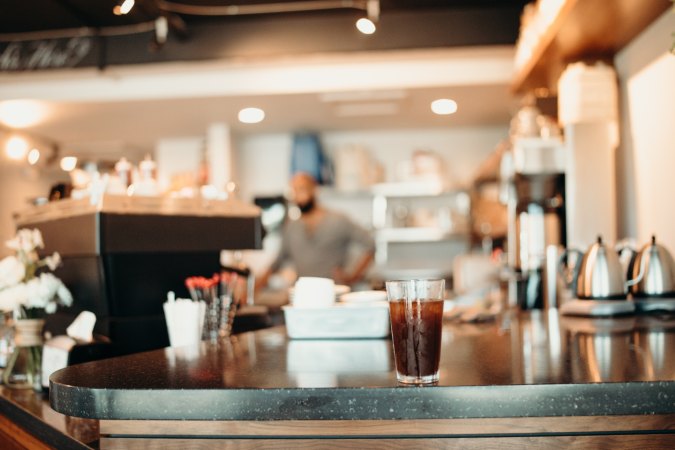
Drink coffee, live longer?
New, independent research found that drinking 3 or more cups of coffee a day may reduce mortality by as much as 13%.

Drink coffee, live longer?
New, independent research found that drinking 3 or more cups of coffee a day may reduce mortality by as much as 13%.
![]()
via Bill Murray, NCA President & CEO on LinkedIn
Daylight savings time is over — will you be grabbing an extra cup of coffee this afternoon?
A recent article in National Geographic looks at the latest research behind why you love (or don’t love) coffee.
Spoiler alert: It’s in your genes!

Cold brew is the hottest trend in coffee: The domestic cold brew coffee market grew 580% from 2011 to 2016, according to research from Mintel.
Now, new research from Philadelphia University + Thomas Jefferson University found chemical differences between hot and cold brew coffee, which may have potential health impacts.

Britain Supplies US Army Store- Americans in Britain, 1943. Photo: Wikimedia Commons
From health and nutrition to the consumption championship, here are some coffee-focused highlights from the (dangerously addicting) New York Times‘ digital archives, The Timesmachine:

“Call it a victory for science — or maybe just for common sense.” – The Seattle Times
It was a good news week for coffee science in California.
Earlier this month, OEHHA (the state’s Office of Environmental Health Hazard Assessment agency) proposed a plan that would exempt coffee from Prop 65 required “cancer warning labels” in California after the most recent ruling in the ongoing legislation.
The statement was met with resounding support from scientists and coffee lovers alike.
“OEHHA’s Rulemaking is supported by both the full weight of scientific evidence and law,” wrote William “Bill” Murray, NCA President and CEO, in comments filed Aug. 30. The letter commended the decision and laid out the strong case for coffee in a scientific summary signed by Dr. Mark Corey, NCA’s Director of Scientific & Government Affairs, and Dr. Alan Leviton, Consultant to the NCA Scientific Advisory Group.
Simply put, the research speaks for itself: coffee does not cause cancer.
Then this week, in a groundbreaking announcement, the U.S. Food and Drug Administration sent a letter to Sacramento which emphatically set forth their support for this rule.

The following article is based on this LinkedIn post by William (Bill) Murray, NCA President & CEO
When it comes to coffee coverage in the media, a healthy dose of context (and common sense) is critical.
Take this week’s Daily Mail article, “How Six Cups of Coffee a Day Can Help You to Live Longer,” on new research from the National Cancer Institute (NCI), published in JAMA Internal Medicine.
Let’s take a look of the story, in light of the science:

The drones could read social cues and biometrics to dispatch caffeine when you need it
Because this doesn’t at all sound like the beginning of a post-apocalyptic dystopia where sentient technology withholds caffeine to control the human population, your coffee may one day be delivered by drone — before you even ask.
IBM has secured a patent for a coffee-delivering drone that reads social and biological cues to know when people will need their next caffeine pick-me-ups, reports USA Today.

The following post is based on an edited LinkedIn post by William (Bill) Murray, NCA President & CEO. See the original post.
Recently, there has been interesting coverage in Runner’s World about drinking coffee and exercise, examining the “common wisdom” that coffee makes you pee, and can be a harmful dietetic before a workout.

Overwhelming research shows that regular coffee consumption may be linked to a host of potential health benefits, from liver health to longevity.
Scientists believe that the secret lies in coffee’s complex chemistry: There are at least 300 natural compounds in one green bean, and about 1,000 more created in the roasting process – including caffeine (of course), antioxidants, and minerals.
Together, the various things that make up coffee create a delicious brew that can be part of a healthy lifestyle.
However, a long-running lawsuit under California’s controversial Prop 65 regulation has sought to force coffee companies to include “cancer warning labels” on coffee package labels and in coffee shops.
Continue readingCoffee can make meetings tolerable more productive – and positive
The following post was originally published by UC Davis News
By Brad Hooker and Julia Ann Easley
Planning a meeting? Serving coffee can focus group discussion, boost involvement and leave members feeling better about their own and others’ participation.
Those are the findings of new research on the effects of caffeine on group performance from the Graduate School of Management at the University of California, Davis.
Decades of coffee research have explored its effects on the individual, but this study is the first on the effects on performance in group tasks.